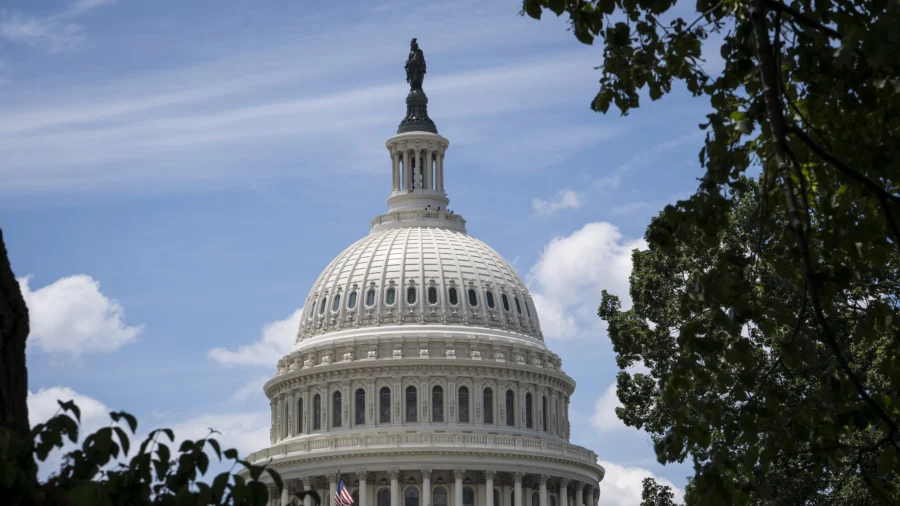The House of Representatives passed 21 China-related bills during the week. These bills focused on reigning in the Chinese Communist Party’s (CCP) influence in areas ranging from trade and farm ownership to biotech, drones, and electric vehicles. Beijing has responded to the passage of one bill with threats.
Referred to as “China Week,” the concentrated legislative push highlights lawmakers’ efforts to curb and counter the CCP’s aggression.
Republicans, holding a majority in the 435-seat House, had enough votes to pass the “China Week” bill package independently. Still, many of the bills appear to have both Republican and Democratic support, reflecting a strong consensus that congressional actions are needed to counter CCP.
The legislation “will take meaningful steps to counter the military, economic and ideological threat of the Chinese Communist Party,” said Rep. John Moolenaar (R-Mich.), chair of the House Select Committee on the Chinese Communist Party. “There’s a bipartisan goal to win this competition.”
China’s Ministry of Foreign Affairs spokesperson Mao Ning said on Sept. 11, when answering a question about the Hong Kong Act passed on Sept. 10, that China has “lodged strong protests to the U.S. side.” Mao threatened that China would take “strong and resolute countermeasures” if the act continued to advance.
Key Legislations
Despite being passed, the measures would still need to clear the Senate. Here’s a look at the key legislation:
The Protect America’s Innovation and Economic Security from CCP Act seeks to establish a China-focused unit within the Department of Justice’s national security division, specifically focused on countering CCP’s efforts to influence, steal, or undermine U.S. intellectual property, technology, and economic assets.
The End Chinese Dominance of Electric Vehicles in America Act aims to reduce China’s control over the global EV supply chain, particularly in battery production, by restricting tax credits for EVs with Chinese-made components.
The No WHO Pandemic Preparedness Treaty Without Senate Approval Act requires any pandemic agreement or treaty negotiated through the WHO to receive two-thirds Senate approval due to concerns over CCP influence.
The Protecting American Agriculture from Foreign Adversaries adds the agriculture secretary to the U.S. Committee on Foreign Investment, requiring land sales involving citizens from China, North Korea, Russia, and Iran to be “reportable” for national security review.
The DHS Restrictions on Confucius Institutes and Chinese Entities of Concern Act limits funding from the Department of Homeland Security (DHS) to universities partnered with Confucius Institutes or other CCP-linked entities.
Confucius Institutes, Chinese regime-sponsored cultural centers, have been criticized in the U.S. for allegedly promoting CCP influence and undermining academic freedom and intellectual property.
The Hong Kong Economic and Trade Office (HKETO) Certification Act aims to scrutinize and potentially limit the operations of Hong Kong’s de facto consulates-Hong Kong’s Economic and Trade Offices (HKETOs) in the United States.
The U.S. president would have the authority to close these offices if the Hong Kong government cannot prove its autonomy from Beijing. This act is part of broader U.S. efforts to hold Beijing accountable for eroding Hong Kong’s autonomy and freedoms.
Taiwan Conflict Deterrence Act authorizes the U.S. Department of the Treasury to restrict financial services to China and disclose Chinese assets in the U.S. if conflict arises in the Taiwan Strait.
Jimmy Quinn, national security correspondent for the National Review, told NTD that it’s unlikely these bills will “end up being passed in the Senate” due to the limited time left in the session before the election. At this stage, “China Week” feels more like a “messaging ploy” tactic to tackle the CCP.
However, after the bills clear the House this week, the Senate will only have two weeks to review them before they adjourn for the month-long pre-election recess, which includes breaks for Columbus Day and Veterans Day.
Additionally, both the House and Senate must prioritize passing a government funding bill by Sept. 30, a task likely to dominate their focus in the coming weeks.
“But for what it’s worth, ” Quinn said, “Beijing is very upset.”
Time to ‘Move Toward Action’
Quinn said that the increased focus on these issues in Washington reflects their growing importance, which he considered a positive development, “So to the extent that this is happening, that’s a good thing,” he said.

